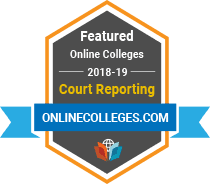Court Reporter Schools
We’ve done the research and created comprehensive guides to online schools for court reporting. Continue below and dive into the details on court reporting degree programs, tuition and fees, related career outlooks, employable skills and much more.
Nov 17, 2017 | By OnlineColleges Editors
